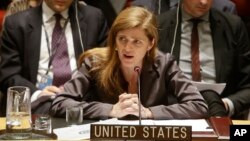The United States on Thursday sharply criticized Sudan for obstructing a United Nations investigation into what Washington's U.N. envoy said were credible allegations of mass rape in the conflict-torn western Darfur region.
Speaking at a meeting of the U.N. Security Council, U.S. Ambassador Samantha Power referred to a new report by New York-based Human Rights Watch, which accused Sudanese soldiers of raping at least 221 women and girls in the village of Tabit over the course of three days.
The council, she said, had to rely on investigations by non-government organizations like HRW because Khartoum had "systematically denied meaningful access" to the U.N.-African Union peacekeeping mission in Darfur (UNAMID).
"To this day, the government of Sudan has shamefully denied the U.N. the ability to properly investigate this incident," Power told the 15-nation council.
She spoke after the council extended for a year the mandate of a U.N. expert panel that monitors compliance with a U.N. arms embargo and other Darfur sanctions. The unanimously adopted council resolution also threatened to add anyone involved in attacks on UNAMID to a U.N. sanctions blacklist.
Sudanese Deputy Ambassador Hassan Hamid Hassan dismissed the HRW report and Power's speech as "a flagrant attempt to level accusations."
He added that UNAMID had never blamed Khartoum for Tabit rapes and the peacekeepers "were not denied access." Sudan denies the incident took place.
The United Nations has repeatedly said UNAMID was denied access. It has also said rape has been used as a weapon of war in Darfur.
HRW's Philippe Bolopion told reporters on Wednesday that lack of access was no reason for not conducting a U.N. investigation. He said his group spoke with victims and other credible sources by telephone to gather evidence.
U.N. spokesman Stephane Dujarric said the U.N. needed full access to conduct a proper investigation.
During Thursday's council meeting, Power cited the deterioration of the situation in Darfur and elsewhere in Sudan, such as South Kordofan, and accused the government of openly violating the arms embargo.
"For every Tabit we know about, there are so many more villages that have been the victims of unspeakable atrocities over the past decade in Darfur," Power said.
The Darfur conflict began in 2003 when mainly non-Arab tribes took up arms against the Arab-led government in Khartoum, accusing it of discrimination.
The United Nations says the conflict has taken up to 300,000 lives and displaced millions.





